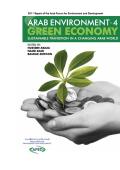
Sustainable Energy is the sixth in the series of annual reports produced by the Arab Forum for Environment and Development (AFED) on the state of Arab environment. The report highlights the need for more efficient management of the energy sector, in view of enhancing its contribution to sustainable development in the Arab region.
This paper sketches the profile of the changing ‘green growth/economy architecture’ at the global, national, corporate and local levels. It finds that the project of ‘green growth’ continues to gain political momentum, attract new investment and draw in new players. Secondly, it describes some of the frontiers of the green economy discussions. In particular, it shows how issues of equity and social inclusion are no longer fringe moral debates – but those of mainstream economics and politics. Thirdly, it questions if the emerging ‘green growth/economy architecture’ is capable of delivering more equitable outcomes and restoring our environment. Finally, the paper points to some of the key changes in order for the green economy to evolve, mature and supersede the brown economy.
This International Institute for Sustainable Development and the Finance Research Institute of the Development Research Centre, State Council of China, are collaborating on an exploration of policy options to support China in developing a “green financial system,” and to encourage such developments internationally. This paper highlights the findings from the first phase of this partnership.
This guide provides a strategic overview on how to best renew the commitment to forests at a time when deforestation and degradation are still rampant. It also presents potential solutions to address business as usual (BAU) as it relates to a viable and more promising future. The intention of this guide is to:
- Emphasize the economic and human benefits surrounding ecosystem goods and services and biodiversity conservation;
- Explore opportunities for forest transformation that are presently available; and
- Increase awareness and coverage of these issues.
